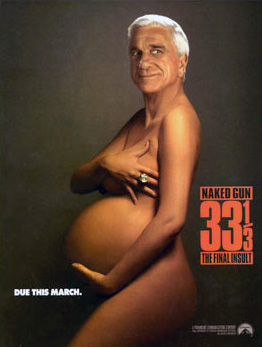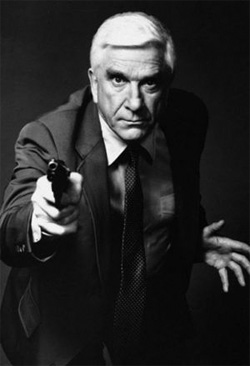In Memoriam: The Late, Great Leslie Nielsen
 In an era of cool, sexy, sparkly, pro-chastity, post-Buffy, and, above all allegorical vampires, it’s hard to believe that a studio once green-lit a farcical comedy called Dracula: Dead and Loving It. But it really happened. Mel Brooks directed in 1995, and the film starred the late, great Leslie Nielsen. Blazing Saddles had been the number two film in America in 1974, and Young Frankenstein had ranked third that same year. Brooks’s Dracula did not fare as well. In fact, it was a real stinker. Still, it is notable as part of the last wave of a certain kind of comedy for which Nielsen was the poster boy. The Naked Gun movies, Airplane, and, on TV, Police Squad! reveled in the kind of one-liners, double entendres, and cheap, delicious sight gags on which the comedians of Brooks’s generation had cut their teeth.
In an era of cool, sexy, sparkly, pro-chastity, post-Buffy, and, above all allegorical vampires, it’s hard to believe that a studio once green-lit a farcical comedy called Dracula: Dead and Loving It. But it really happened. Mel Brooks directed in 1995, and the film starred the late, great Leslie Nielsen. Blazing Saddles had been the number two film in America in 1974, and Young Frankenstein had ranked third that same year. Brooks’s Dracula did not fare as well. In fact, it was a real stinker. Still, it is notable as part of the last wave of a certain kind of comedy for which Nielsen was the poster boy. The Naked Gun movies, Airplane, and, on TV, Police Squad! reveled in the kind of one-liners, double entendres, and cheap, delicious sight gags on which the comedians of Brooks’s generation had cut their teeth.
The Scary Movie franchise obviously owes much to this kind of comedy, yet the films are cruder and dirtier, mostly parodying other movies and inviting viewers to laugh simply by virtue of recognizing what is being mocked. When Airplane’s Jerry Zucker was hired to direct number three, his would-be trump card was casting Nielsen in a bit part. (It didn’t save the film, but, still, it was a good idea.) Nielsen also appeared in Scary Movie 4, and his final, posthumous performance will be in Scary Movie 5. Somehow, it seems unlikely that Nielsen will snag an Oscar like Heath Ledger did. But it is a sure bet that Nielsen will get a massive round of applause during the “In Memoriam” section of the Oscars, and we can fervently hope for an homage clip reel—anything to offer relief from the Serious and Important movies that dominate the industry’s annual celebration of itself. Will viewers perhaps even be treated to the finale of Naked Gun 33 1/3, in which Nielsen thwarts a terrorist attempt to blow up the Academy Awards?
Nielsen was not a subtle, interior performer, but we can still classify him as a classic less-is-more comedian. He didn’t bother with neuroses (Ben Stiller) or infantile bluster (Adam Sandler, Jack Black). Most contemporary comedies set up some kind of personal problem to be solved. Black needs to grow up, find a real job, and feel the urge to accomplish something in School of Rock. Ditto Seth Rogen in Knocked Up and the goofs of Hot Tub Time Machine. Stiller contends with crazy in-laws in the Fockers franchise. These plot-driven movies convey some vague notion that their characters have interiority.
Nielsen didn’t mess with such tomfoolery. All he needed was funny dialogue and his trademark deadpan delivery or wide-eyed reaction shot. There was also a lot of physical humor; somehow, even when you were sure a stuntman was performing the pratfalls, you still credited Nielsen for the laugh. It wasn’t Shakespeare. Or Preston Sturges, for that matter. But it worked. In the Naked Gun, Nielsen is charged with thwarting a plot to kill Queen Elizabeth. This naturally ends in a hilarious showdown that includes a Queen lookalike. By the conclusion of any Naked Gun movie, we can be sure that dignified people will get knocked around, their asses up in the air like Mabel Normand in a Keystone comedy. There’s no need to waste time with our hero’s “issues.”
Like a comic Vincent Price, Nielsen could waltz through the most absurd set-up and deliver exactly what the script demanded. He began as a serious actor in films like Forbidden Planet and Tammy and the Bachelor, and in Playhouse 90 productions, so it should come as no surprise that he was a competent professional who knew how to hit his marks, deliver a straight line, fall down, or use a prop in an undignified manner. But this particular kind of performance—parodic without being cynical, funny without the pretense of sophistication, and sometimes self-effacing, with sight gags funnier than the comedian’s reaction to them—is not what is currently held in highest esteem.
 Roger Ebert once called Nielsen “the Olivier of spoofs,” but spoofing is not very fashionable today; rather, it is improvisation that is most highly regarded, and filmmakers like Judd Apatow oblige by laboriously coaxing dialogue from performers rather than scripting the words themselves. A recent New Yorker article on Steve Carell actually holds up Airplane as an example of “traditional” comedy conveying “a sleekness that calls to mind the typewriter.” Improv, conversely, should “feel fresh and unstudied… [with] a skewed specificity that bears the stamp of an actor’s subconscious.” There’s no doubt that improvised comedy is often terrific, and infinitely better than the canned stuff of, say, Two and a Half Men. Yet the idea that the scripted Airplane is somehow inherently stale and studied strikes me as snobby and—even worse—humorless. Carell is brilliantly intuitive, and presented with a single prop (a boiled lobster) and simple instructions (“be funny!”) he could probably surpass Nielsen in improvising a hilarious routine. In Naked Gun 2 ½, Nielsen just follows the script. As he digs into a lobster, lemons fly through the air, the lobster’s giant claw accidentally clamps down on a lady’s booby, and Nielsen accidentally smacks Barbara Bush right in the kisser, sending her flying. This tightly scripted, choreographed scene is executed like a Rube Goldberg Machine. And that’s why it’s funny.
Roger Ebert once called Nielsen “the Olivier of spoofs,” but spoofing is not very fashionable today; rather, it is improvisation that is most highly regarded, and filmmakers like Judd Apatow oblige by laboriously coaxing dialogue from performers rather than scripting the words themselves. A recent New Yorker article on Steve Carell actually holds up Airplane as an example of “traditional” comedy conveying “a sleekness that calls to mind the typewriter.” Improv, conversely, should “feel fresh and unstudied… [with] a skewed specificity that bears the stamp of an actor’s subconscious.” There’s no doubt that improvised comedy is often terrific, and infinitely better than the canned stuff of, say, Two and a Half Men. Yet the idea that the scripted Airplane is somehow inherently stale and studied strikes me as snobby and—even worse—humorless. Carell is brilliantly intuitive, and presented with a single prop (a boiled lobster) and simple instructions (“be funny!”) he could probably surpass Nielsen in improvising a hilarious routine. In Naked Gun 2 ½, Nielsen just follows the script. As he digs into a lobster, lemons fly through the air, the lobster’s giant claw accidentally clamps down on a lady’s booby, and Nielsen accidentally smacks Barbara Bush right in the kisser, sending her flying. This tightly scripted, choreographed scene is executed like a Rube Goldberg Machine. And that’s why it’s funny.
With Nielsen gone, where will Barbara Bush and Queen Elizabeth lookalikes find work, and suffer massive indignities? Where will viewers yearning for a good fart joke unencumbered by the stamp of the actor’s subconscious turn? After a long day, with a pizza in front of you and a cold beer in your hand, would you really rather see Seth Rogen learn to stop smoking pot and be a good dad than Leslie Nielsen reenacting the Untouchables homage to the Battleship Potemkin staircase sequence? Surely not. And don’t call me Shirley.



Brilliantly written, Heather! A most appropriate and marvelous ode to a truly great actor!